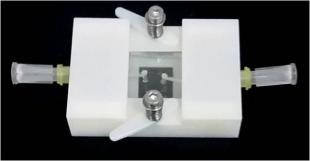Development of microfluidic systems and microchips for evaluation and monitoring of hemostasis
Mar 31, 2017
Jasmina Casals-Terré: "The final objectiveof the project is the development of small devices that can be used for the diagnosis of hemorrhagic-thrombotic diseases"
Researchers from Mechanical Engineering Deparment (Dr. Josep Farré and Dra. Jasmina Casals-Terré) from MicroTech Lab participate in the project led by Dr. Ginés Escolar of the Hemotherapy Service and Hemostasis (CDB) from Clinic Hospital, IDIBAPS which also counts with the collaboration of the "Atherothrombosis Research Unit", Cardiovascular Department, Mount Sinai Hospital New York.
The project receives funding Of the ISCIII for Calls and Aids Strategic Health Action (AES2016). The project entitled "Microchips for the global evaluation of hemostasis in the head of the patient (POC): applications in the detection of alterations and in the monitoring of antithrombotic therapies" and has as its final objective the development of small devices that can be used for the diagnosis of hemorrhagic-thrombotic diseases, for the evaluation of reactivity of prosthetic materials and for the monitoring of antithrombotic treatments. An innovative aspect of this proposal is the integration of microsensors into miniaturized microfluidic devices that can be used in close proximity to the patient, be connectable to portable units (mobile phones or tablets) and facilitate rapid and accurate evaluation of hemostasis and effects Of antithrombotic drugs. The objectives will be achieved through the interactions of researchers who have experience in the hemorrhagic and thrombotic clinic in patients and their evaluation in traditional and advanced laboratory systems. This clinical experience is combined with the knowledge of materials and the ability to design microfluidic devices provided by researchers specialized in microtechnologies.
The researchers have the strategic support of two companies from the productive sector with extensive experience in the diagnosis of hemostasis and in the development and application of microfluidic systems to different experimental and clinical needs. The involvement of CBD management in efforts to attract the interest of these companies has been a key factor for the success of the proposal.

Share: